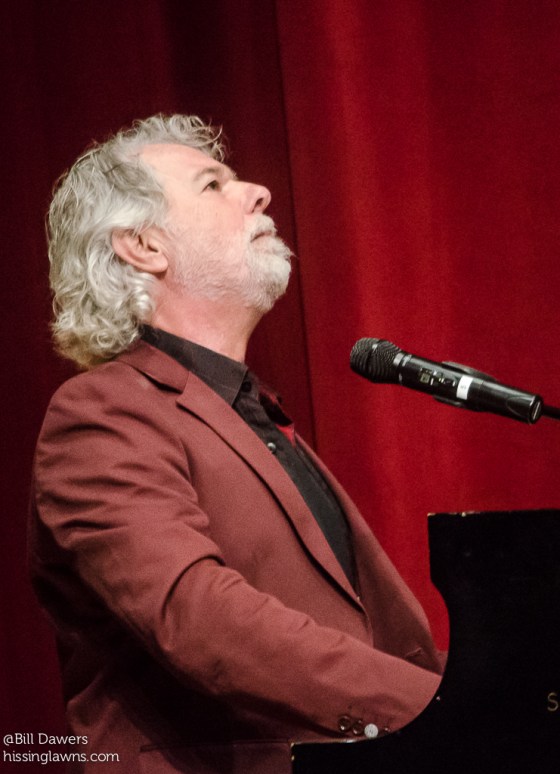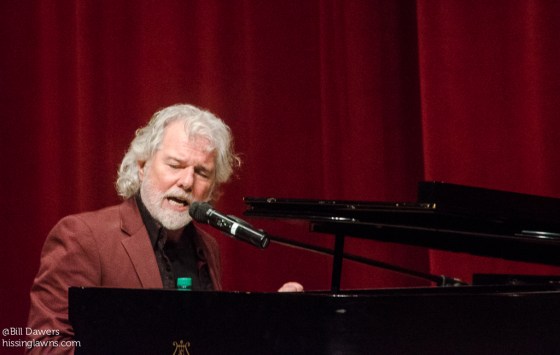Fifty years ago this week, The Rolling Stones played at Georgia Southern in Statesboro and spent a night at the Manger Towne and Country Motor Lodge on Highway 17 in Savannah. Sadly, that was Savannah’s closest brush with the Stones until Friday night at Armstrong State University, where Chuck Leavell — the Stones’ keyboardist of 30+ years and a leading environmentalist — delivered the first Mark Finlay Memorial Lecture, which he wrapped up with three songs on the piano.
After a warm introduction by ASU President Linda Bleicken, Leavell graciously began his talk with remarks about Mark Finlay’s family. Mark would have loved the entire event. For those of you who don’t know: Mark Finlay was a history professor and assistant dean at Armstrong, but his influence extended far beyond any easy description. He was passionate about environmental causes and about music too — he supported events like Savannah Stopover and many times I’d run into him at an obscure rock show, often one that I had previewed in the newspaper or on Savannah Unplugged. Mark was a great scholar and an innovative thinker; I greatly admired his subtle managerial style and valued his friendship. (Mark passed away after a 2013 auto accident.)
Leavell’s resume is almost unbelievable — how does someone get so much done in a lifetime? In addition to his work with the Stones, Leavell’s website notes his work with “Eric Clapton, George Harrison, The Allman Brothers Band, The Black Crowes, Gov’t Mule, Train, John Mayer” and others, in addition to his solo projects. He also founded the Mother Nature Network, is an active tree farmer, and has written three highly regarded books.
In his opening remarks, Leavell praised the beauty of the Armstrong campus (really, it’s pretty amazing) and said how glad that he and his wife Rose Lane are about buying a house and becoming “part of the Savannah community.”
Leavell divided his talk into two parts: stewardship and partnership. I didn’t get the quote written down precisely, but Leavell said that we don’t so much inherit the earth from our parents as we borrow it from our children and grandchildren. As both a practical matter and as a moral charge, we need to take better care of the earth. He mentioned the old saying, “There’s an art to everything,” and argued that the earth is the “canvas we have.”
Those phrases aren’t just easy slogans for Leavell. He and his wife run the 2900-acre Charlane Plantation in Twiggs County.
I didn’t really expect Leavell to talk that much about The Rolling Stones, but he used the resilience of the band as an example of the value of true partnerships.
He noted that in his time with the Stones, all the members had separate lives and could have devoted themselves entirely to solo careers, but they saw the value in continuing the partnership. Along the way, he peppered his talk with wonderful anecdotes about Mick Jagger (“a great harmonica player”, the band’s “unspoken CEO”), Keith Richards (an “old softie” who is “almost an expert on WWII” and “continues to defy modern medical science”), Charlie Watts (a “jazz aficionado” and raiser of Arabian horses in Devonshire), and Ronnie Wood (a successful visual artist with an “effervescent personality” who is the band’s “catalyst”).
A partnership, indeed. Leavell was upbeat about the future of partnerships between various entities that have a stake in a healthy environment.
During the Q & A, I asked Leavell about the initial contacts with the Stones. He told a quick anecdote about meeting Charlie Watts at a party in England, but the lasting contact was made through the late, legendary promoter Bill Graham, who knew Leavell from his work with the Allmans and was working in the early 80s with the Stones. Leavell said that he had been doing just fine with his band Sea Level but had a sense that he should back away from music for a while to devote more time to the plantation that his wife had inherited. He said that one day when he came home, he was telling his wife about his decision to take a break from music, and then she said: “The Rolling Stones called you today.”
After fielding a few more questions — about everything from southern rock to long leaf pine — Leavell finally sat down at the Steinway. He played and sang the old song “Down the Road a Piece”, which has been performed by many artists over the years, including Chuck Berry and The Stones. I’d love to see the Stones dig deeper into their old catalog of early rock covers, including some of the blues and R&B numbers.
Next was “Savannah” – an absolutely gorgeous composition (no vocals) – off Leavell’s 2005 album Southscape.
And then he finished with a rollicking version of the Stones’ “Tumbling Dice” from 1972.
Leavell was just as gracious at the reception in his honor as he was at the talk. Quite a night.
















3 comments for “Chuck Leavell: “There’s an art to everything””